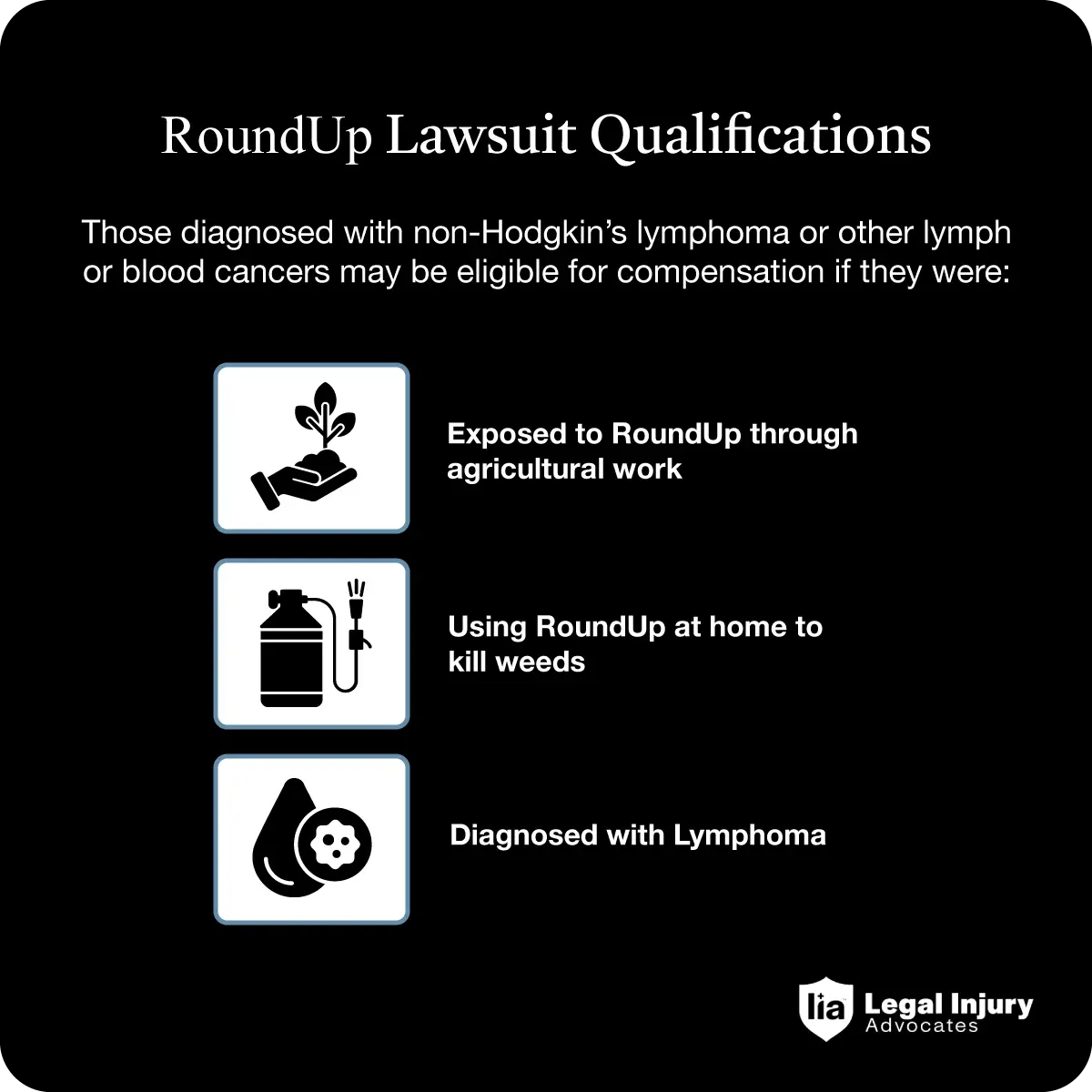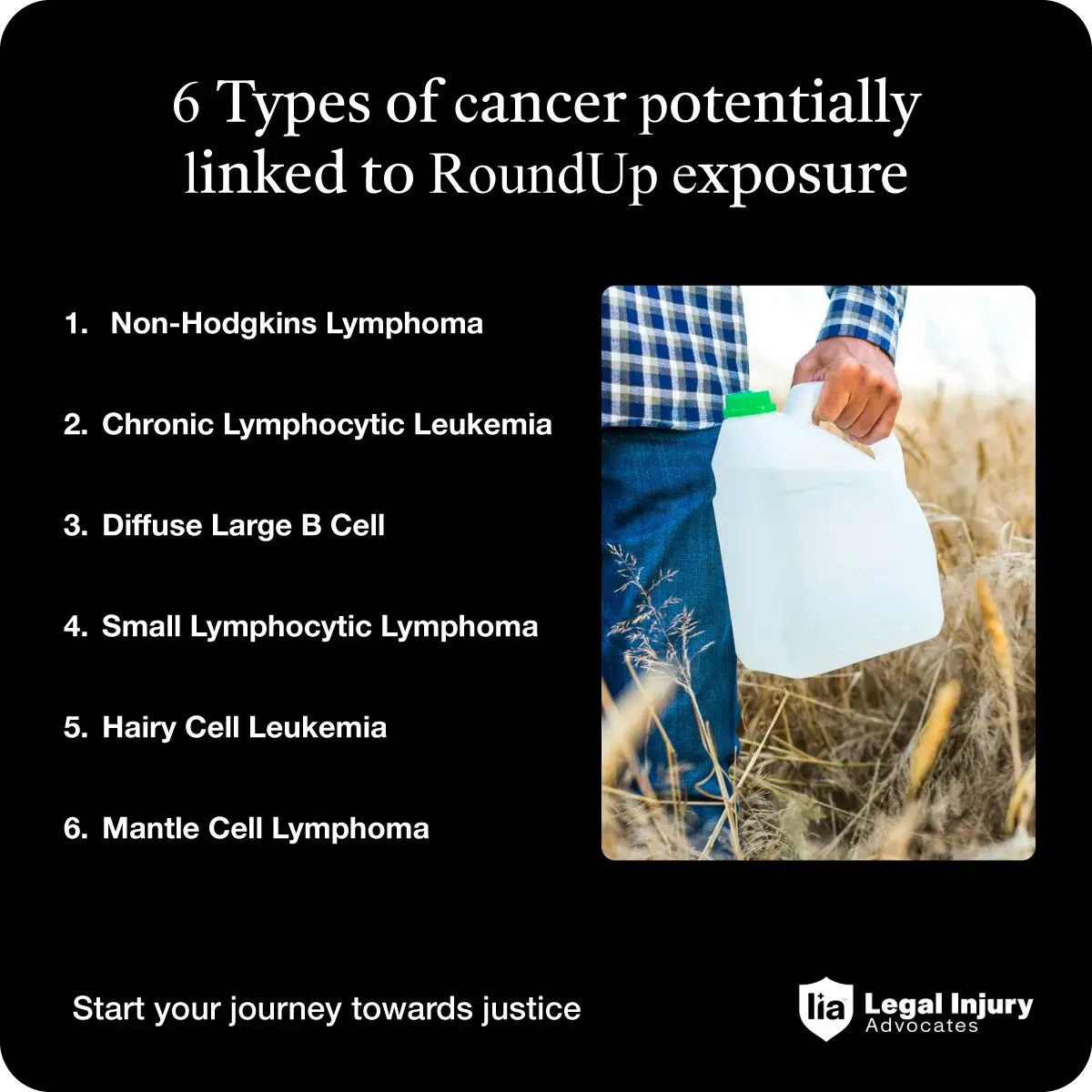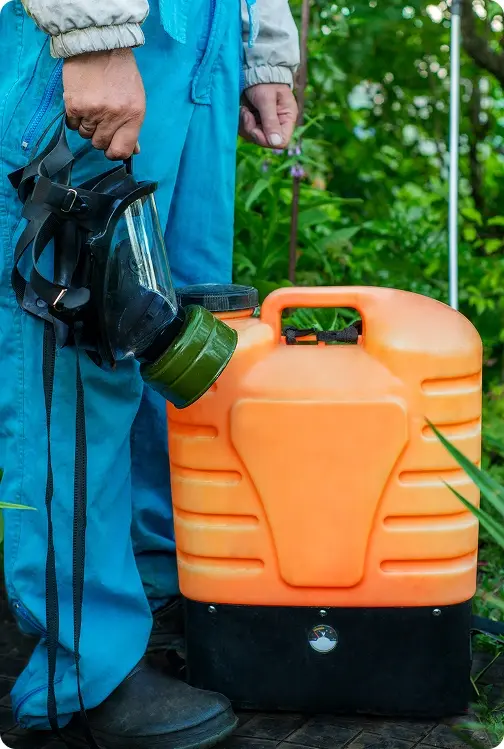Seek justice for you or your loved ones
Who may qualify for a Roundup lawsuit?

What qualifies you to file a Roundup claim? Here are the criteria:
- Have you been diagnosed with non-Hodgkin’s lymphoma or other lymph or blood cancers?
- Have you had a history of using Roundup or being exposed to it prior to your diagnosis?
Your ability to file a claim depends on your answers to these questions and a few others. It makes sense to talk to an attorney with experience with Roundup lawsuits to advise you on your specific situation.

How to start your Roundup claim:
-
1
Fill out the form or call us at (855) LIA-5555.
Start by completing our online form or giving us a call to share basic details about your claim, your cancer, and your experience with Roundup. -
2
Share your story with our team.
Our team will listen to your Roundup story, answer questions and assess whether your claim may qualify for legal action. -
3
Let our legal team review your claim.
An experienced Roundup specialist will review your claim and discuss next steps. -
4
Prepare for your case.
You may need to submit medical records or important documents to help your attorney evaluate the extent of harm caused by your exposure to Roundup. We’ll discuss this with you. -
5
Start your journey to justice.
If your claim qualifies, our legal team will guide you through the legal process to seek compensation and accountability from the makers of Roundup.
Check If You Qualify
Submit your claim here:

Health risks allegedly linked to Roundup weed killer exposure

Roundup weed killer has been declared a “probable human carcinogen” by the World Health Organization (WHO). That means that the active ingredient in Roundup may cause cancer in humans and animals.
Medical studies have found that jobs involving frequent glyphosate use may increase the risk of getting cancer from Roundup exposure. Some of these industries include:
- Agriculture
- Barge Operation
- Farming
- Forestry
- Landscaping
- Trucking
- Transportation
Because Roundup is a widely used consumer product, it is also possible you have experienced exposure simply by taking care of your lawn and garden.
The connection between glyphosate and cancer
Glyphosate use has dramatically increased to the point where Americans’ exposure to the chemical grew by 500% between 1996 and 2017.
The International Agency on Research for Cancer has linked Roundup exposure to non-Hodgkins lymphoma.
As recently as January 2024, a jury awarded $2.25 billion to a man who used Roundup in his garden and developed non-Hodgkin’s lymphoma.
Types of cancer that may be associated with using Roundup
Roundup may affect the lymphatic system, which is your body’s disease-fighting power, working through your circulatory system and blood. When normal cells in your lymph system grow out of control, cancer becomes a concern.
Roundup exposure has been linked to these specific lymph and blood cancers:
- Non-Hodgkins Lymphoma
- Chronic Lymphocytic Leukemia (CLL)
- Diffuse Large B Cell
- Small Lymphocytic Lymphoma (SLL)
- Hairy Cell Leukemia
- Mantle Cell Lymphoma
Companies involved in the Roundup lawsuits

Roundup is marketed by two related companies:
- Monsanto: This company introduced Roundup as part of its $4.76 billion a year herbicide business. The product earned Monsanto $4.8 billion in revenue in 2015, prior to the company being acquired.
- Bayer: This company acquired Monsanto in 2018. Bayer CropScience had revenues of $25.3 billion in 2023.
You and your family may be owed compensation for medical expenses, lost wages, and the suffering caused by cancer due to your exposure to Roundup. These lawsuits also serve to raise public awareness and push for stricter regulations on the use of harmful chemicals like glyphosate, which is the key ingredient in Roundup.

Important Roundup lawsuit updates
Roundup lawsuits are wide-ranging, with changes announced nearly every month. Here are some of the most important updates on the case:
- Settlement and jury award amounts are changing all the time, such as $289 million awarded to a dying man in 2018 and an estimated $11 billion paid to settle nearly 125,000 cases around 2020.
- The U.S. Environmental Protection Agency listed Roundup’s main ingredient, glyphosate, as cancer-causing.
- A recent 2024 verdict awarded $2.25 billion (later reduced to $400 Million) to a man diagnosed with non-Hodgkin's lymphoma after using Roundup in his yard for over 20 years.
-
October 2024: $78 million awarded
A Pennsylvania man was awarded $78 million in his case linking Roundup with cancer.
-
June 2022: U.S. Supreme Court rejects Bayer
Bayer, the makers of Roundup, appealed to overturn a case that held them liable for $87 million. The Supreme Court upheld the judgment, meaning Bayer has to pay.
Reasons to work with a Roundup lawyer
Gathering medical records about your cancer, proof you used Roundup, and any other relevant documentation is essential for building a strong claim. Your legal team will guide you through the legal process, from filing the claim to seeking compensation for damages.
Your lawsuit against Monsanto and Bayer isn’t just about seeking compensation and justice for yourself. You can hold manufacturers accountable for their actions and their products.
Legal Injury Advocates, along with our co-counsel, can help you determine if you have a strong claim against Monsanto/Bayer. If you qualify, we will guide you through the legal process and work to secure the compensation you may deserve.
We are fully dedicated to providing you with the legal support you need and helping you stand up for your rights. Contact us for a free initial claim evaluation to explore your options and take the first step toward justice.

Why Roundup victims trust Legal Injury Advocates

Free Initial Claim Review
We’ll review your claim for free—no upfront costs, no risk.
Clear, Honest Communication
We, along with our co-counsel, will keep you informed every step of the way with straightforward, honest updates.
Legal Help Anywhere in the U.S.
Our team is ready to fight for you no matter where you live, if you qualify.*
No Fee Unless You Win
You don’t pay anything unless we win your case—no risk, no obligation.
Initial Eligibility Check
Call us at (855) LIA-5555 or fill out the form to see if you qualify.
Proven Results
Our experienced legal team and co-counsel have spent decades winning cases like yours.
*We cannot accept cases in Tennessee.
You may have a strong Roundup claim, but time may be limited to file. Contact us to see if you qualify:
FAQs
-
What is the Roundup lawsuit about?
Roundup is one of the most well-known weed killers in the world. Since it was first launched by Monsanto in 1974, it has dominated the market and has been widely used. Farmers use it to dry crops for easier harvesting and consumers use it to kill unwanted garden weeds.
While Roundup works to control weeds, it may bring with it serious health risks. It has been suggested that you may have a 41% greater risk of developing non-Hodgkin’s lymphoma if you have been exposed to Roundup’s active ingredient, glyphosate.
As of February 2025, approximately 177,000 lawsuits have been filed against the makers of Roundup.
Bayer is pushing for state-by-state legislation that would shield the company from lawsuits. If you believe there is a link between your cancer and your exposure to Roundup, it is important to see if you qualify for a claim, as your time to file may be limited.
-
Is there a Roundup class action lawsuit?
A number of actions are taking place against the makers of Roundup. Your attorney will determine the correct jurisdiction and venue to file your case if you qualify.
-
Does Glyphosate in Roundup cause lymphoma?
Medical research has suggested links between Roundup and non-Hodgkin’s lymphoma, and multiple juries since the first verdict in 2018 have awarded people who got cancer after using Roundup with billions of dollars in total compensation.
-
Is Roundup banned?
Roundup is still available for use by consumers. The U.S. Environmental Protection Agency states it is safe to use if you follow the proper handling instructions. You can learn more about the EPA’s assessment as of January 2020.
